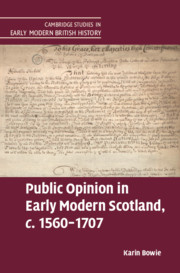Book contents
- Public Opinion in Early Modern Scotland, c.1560–1707
- Cambridge Studies in Early Modern British History
- Public Opinion in Early Modern Scotland, c.1560–1707
- Copyright page
- Contents
- Acknowledgements
- Abbreviations
- Introduction
- Chapter 1 Protestations
- Chapter 2 Petitions
- Chapter 3 Oaths
- Chapter 4 Public Communications
- Chapter 5 The Inclinations of the People
- Chapter 6 The Sense of the Nation
- Conclusions
- Bibliography
- Index
Chapter 2 - Petitions
Published online by Cambridge University Press: 21 December 2020
- Public Opinion in Early Modern Scotland, c.1560–1707
- Cambridge Studies in Early Modern British History
- Public Opinion in Early Modern Scotland, c.1560–1707
- Copyright page
- Contents
- Acknowledgements
- Abbreviations
- Introduction
- Chapter 1 Protestations
- Chapter 2 Petitions
- Chapter 3 Oaths
- Chapter 4 Public Communications
- Chapter 5 The Inclinations of the People
- Chapter 6 The Sense of the Nation
- Conclusions
- Bibliography
- Index
Summary
Like the protestation, the petition helped to make extra-institutional opinion more visible in early modern Scotland. Petitions were a traditional tool for initiating dialogue, normally in humble terms that emphasised the pleas of the petitioner and the authority of the recipient. Buoyed by religious convictions, political petitioners in Scotland defied these norms by presenting conscientious arguments reinforced with signatures and crowds. They might even petition repeatedly when answers were unsatisfactory. Though these adversarial political activities capitalised on the conventional idea that a good prince should hear the grievances of his people, successive monarchs sought to constrain what they saw as seditious and tumultuous behaviour. This chapter traces episodes of assertive petitioning in Scotland, showing how petitioning stimulated and expressed opinions at large, especially under James VI and Charles I, and how the crown responded to these challenges with the suppression of unwelcome petitioning from the Restoration to the Revolution.
Keywords
- Type
- Chapter
- Information
- Public Opinion in Early Modern Scotland, c.1560–1707 , pp. 50 - 88Publisher: Cambridge University PressPrint publication year: 2020

